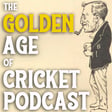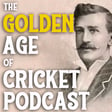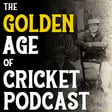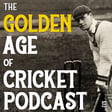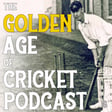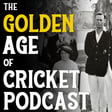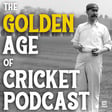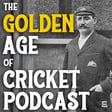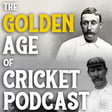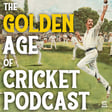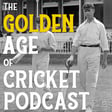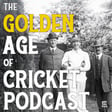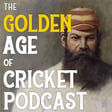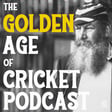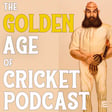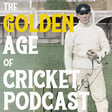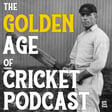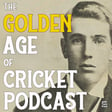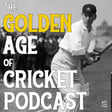00:00:01
Speaker
In the good old summertime, in the good old summertime.
Introduction to the Golden Age of Cricket Podcast
00:00:09
Speaker
Hello and welcome to this episode of the Golden Age of Cricket podcast.
00:00:12
Speaker
My name is Tom Ford.
Gilbert Jessop's Legendary Status in Cricket History
00:00:14
Speaker
There is perhaps no English cricketer who encapsulates the spirit of the Golden Age more than Gilbert Jessop, a wildly talented all-round amateur from Gloucestershire, whose great improbable batting at the Oval during the fifth Test match of the 1902 Ashes, not only won the match, but established a mythical-like status for himself and the age, which has only grown in reputation since.
Exploration of 'Chasing Jessop' by Simon Wilde
00:00:40
Speaker
To this day, his match-winning century remains the quickest by an Englishman in Test cricket. A new book, Chasing Jessop, the mystery of England cricket's oldest record, has just been published and chronicles not only Jessop's colourful career, but forensically dissects one of the most famous individual feats in the history of the game.
00:01:03
Speaker
Simon Wilde has been cricket correspondent of the Sunday Times since 1998. He has written 12 books, three of which were shortlisted for the William Hill Sports Book of the Year.
00:01:14
Speaker
His most recent works have been the acclaimed England, the Biography, A History of the Men's National Team, and The Tour, which chronicles the England team's travels overseas since 1877, which won the MCC Cricket Society Book of the Year Prize.
00:01:31
Speaker
He is a returning guest, having appeared on the podcast to discuss the life and times of Ranjit Sinji, whose biography he also wrote. Simon, welcome back to the podcast.
00:01:42
Speaker
Hi, Tom. Congratulations
Inspiration Behind Writing About Jessop
00:01:44
Speaker
on the new book. I had the privilege of reading it just before it was released, and it ah it's riveting from cover to cover. It sort of unfolds like an adventure novel.
00:01:54
Speaker
um Can I ask you what impelled you to write this book about Gilbert Jessop's great innings, and was it inspired by living and working in the era of Baz Ball?
Challenges in Verifying Jessop's Achievements
00:02:08
Speaker
yes, it was. ah the The reason I wrote the book was because of Baz Ball and because so many of these guys playing in the England team, the likes of Harry Brook and Ben Duckett, the Brett Crawley, and Johnny Birstow, who's no longer in the team, um all got so close to the Jessup record, but have been unable to quite knock it off its perch. um And that sort of sent me back to...
00:02:35
Speaker
1902 and to check how much we actually knew about this amazing feat. I mean, obviously, I, you know, I was familiar with it up to a point, but um if it felt like it needed some further investigation because there was a quite a bit of sort of chat about, you know, is this record real? How much do we know about it?
00:02:53
Speaker
And it and could i could i could I check it out further? And I started looking and um I sort of got deeper and deeper into the sort of mystery of it, really, because there's some there are no surviving scorebooks.
00:03:06
Speaker
They didn't use to record batsmen's innings ball by ball in the way they do today. And so it actually became a bit of a puzzle to work out what had happened. Yeah, and it's it's a fascinating read, both in terms of the the narrative, but what you've uncovered.
Research Methods for 'Chasing Jessop'
00:03:21
Speaker
And we'll get into that a bit later in terms of your own analysis of Jessup's innings.
00:03:27
Speaker
um What comes across while reading the book is that Really, your your prime ah resources in terms of the famous endings by Jessup are the local newspapers and some international newspapers as well.
00:03:41
Speaker
um But you did actually also have some sources from Jessup's granddaughter, didn't you? ah Tell us about that connection and what she was able
Jessop's Family and Legacy
00:03:51
Speaker
to provide. Yeah.
00:03:52
Speaker
but the The story is Jessup was one of 12 children. um He was the 11th of 12 children. And one of his sisters, Winifred, used to keep cuttings of Jessup's great feats. And she must have been quite busy because he yeah he did many amazing things in county cricket and but less over for England, apart from the Oval, 1902.
00:04:11
Speaker
But... but Anyone keeping cuttings on Jessup must have been busy because um you know he he was making headlines and all the time, really. yes um Anyway, Winifred's scrapbooks still survive. They're in the family, in the possession of the family.
00:04:26
Speaker
And so um Jessup's granddaughter, Lucy Jessup, she lives in Ireland. She's a doctor. um She... she sort of got got these scrapbooks and um she she well she sort of helped me at the start of the puzzle, really. I mean, I didn't actually ever go and see her.
00:04:45
Speaker
and So I haven't actually handled the scorebooks, but she sent me some photos of certain cuttings. um So she sort of her help couple of years ago got me going, really.
00:04:56
Speaker
um ah That was it was a sort of early starting point. um To sort of digress slightly from that, when Gerald Rodtrib wrote a biography of Jessop in the 1970s to coincide with the centenary of Jessop's birth, 1974, he used the Jessop scrapbooks, the family scrapbooks,
00:05:17
Speaker
But what i discovered what I discovered when I sort of dug further is that actually that's all he used. So it wasn't like wasn't like there was he'd he'd done he'd gone through every newspaper of the period.
00:05:30
Speaker
ah He'd gone through the ones that were in the cuttings books, which was comprehensive, but obviously there were others. And so when I then started researching it more broadly, I then found other cuttings that had they hadn't picked up on. um I mean, clearly there's a limit to how many newspapers can lay your hands on at the time, but now the help of archives and the rest of it, obviously I can ah can get to many more. So Yeah, the Jessup family helped me at the start of the journey, but um ah I then went off on my own tracks afterwards. But um yes, it also so Jessup's granddaughter, Lucy, alive, as is um Jessup's daughter-in-law, Pat.
00:06:07
Speaker
She married Jessup's He was quite old when he married her. She was quite young. So she's still alive and and well lives in Bath, I think. But... um Yeah, so the it's quite sort of quite close family are still around, even though obviously Gilbert Jessup was born ah more than 150 years ago.
00:06:26
Speaker
Yeah, I mean, I didn't know that. I didn't realise that his daughter-in-law was still alive. That is quite a connection, and they're few and far between with players from the Golden Age.
Jessop's Upbringing and Early Cricket Influence
00:06:36
Speaker
i'm um I'm glad there, Simon, that you mentioned a previous biography, which was written by Broderib,
00:06:43
Speaker
um which I'm sure many of my listeners would know because ah your book is a welcome addition to ah the Golden Age literature because there really hasn't been an updated biography on Jessup really since then, 1974. So ah know many people will be ah saying yours is a welcome addition because your book isn't just about the famous innings. It does delve into his early life, which is what I'd like to talk to you now about. You've already mentioned he was um he was born in 1874. He was ah the 11th of 12 surviving children ah to Henry and Susanna Jessop.
00:07:25
Speaker
What can you tell us about his early life and how much did cricket play a role in those early years?
Unique Development of Jessop's Cricket Skills
00:07:35
Speaker
um Well, cricket cricket was a big part of his life from very early on. um He played with his brothers and sisters in the family home in Cheltenham.
00:07:43
Speaker
They had a smallish garden with various sort of obstacles the way that the way that family gardens do. Mm-hmm. So he played a lot with them. um he he he was he was He loves all sorts of sports. when need like he you know He played rugby and football and he was a very good sprinter.
00:08:02
Speaker
um he was you know He was a good all-round sportsman from a young age, really, and I don't think his parents were particularly keen on it. They didn't push him towards sport. He just naturally gravitated towards it. but he So he went to Cheltenham Grammar School.
00:08:17
Speaker
um Gustav Holtz was at Cheltenham Grammar School around the same time. We don't know much about how friendly they were, but it's quite a nice connection. um yeah um The big event in his life was um at this stage was is his father, Henry, who was who was a local coach.
00:08:34
Speaker
ah surgeon, I think, um ah died when Gilbert was 15. So Gilbert had to leave Cheltenham Grammar School. His father had been one of the um governors, I think is probably the right phrase. um At that time, Gilbert had to leave school as a result of his father's death.
00:08:51
Speaker
This was obviously an unfortunate event in terms of his sort of development. he the family came up with a solution of him going to other schools and working as a sort of assistant teacher, really, and and continuing his education in the process, but thereby he didn't have to they didn't have to pay for him to do so. So they came up with us the best solution available.
00:09:12
Speaker
The main point about this development was that he he was able to continue playing cricket as a master alongside the boys at some of the schools he but he he went to. He moved around a bit. He worked at about three or four schools.
00:09:25
Speaker
Mm-hmm. Basically, he played a an enormous amount of cricket as a young man. Also, the other key thing is because he didn't go to one of the major public schools like Eaton, Harrow, this sort of thing, he wasn't ah he wasn't coached in the way that some of the other leading amateurs of the period were of the golden age yes heroes you all know about.
00:09:45
Speaker
um he ultimately He eventually got to Cambridge, but he went there when he was maybe early twenty s so later than normal. And by that point, he had developed a way of playing that was unique to himself. And he said he did say, if id if I'd been coached properly, you know I wouldn't have played the way I did. So he had quite an unusual upbringing in terms of cricketing development, but he was absolutely central to how he ended up playing the game.
Serendipitous Entry into Gloucestershire Cricket
00:10:13
Speaker
Yeah, fascinating. And we're going to touch on a little bit later about his unorthodox style, which ah many of my listeners probably already know about, a certain way he stood at the wicket. So, Simon, after the legendary WG Grace, ah Gilbert Jessup is perhaps the most famous name associated with the Gloucestershire Cricket Club, County Cricket Club, in the 19th century at least.
00:10:40
Speaker
You've talked about how he's playing a lot of cricket and how he moves around a bit. How did he eventually find his way playing for Gloucestershire?
Financial Challenges of Amateur Cricketers
00:10:48
Speaker
Well, it happened quite by chance, actually. I mean, he may have got there in the end anyway, but a cousin of his, who was quite a good club cricketer, got an invitation to attend a trial, Gloucestershire trial.
00:11:00
Speaker
His cousin couldn't go, so he suggested that Gilbert went in his place, which he did. And the match took place at the county ground in Bristol. um and WG Grace happened to be watching. The reason he was watching, I think, was because his son was playing, and Gilbert Jessup ran out WG Grace Jr. with a brilliant piece of athleticism, athletic throw, direct hit, run out, and that sort of thing.
00:11:29
Speaker
um Jessup was in a phenomenal field. he was He was the best English fielder of the golden age. It was one of the reasons he got picked for a lot of teams. And W.G. Grace obviously noticed this feta this feat of athleticism and was immediately impressed and basically said, jessup's I think Jessup had quite a good all-round game in in that sort of trial.
00:11:52
Speaker
W.G. Grace said, we've got ah you know this guy's got to play, um and he did. um and And in fact, I think Jessup, sorry, W.G. Grace a couple of times wrote to the schools that Jessup was working at as a teacher and said, please, can you give him time off? Cause I want him to play for Gloucestershire against you.
00:12:09
Speaker
Lancashire, Old Trafford, whatever it was. um And they acquiesced. WG Grace had a quite an important role at the outset of Jessup's career. Yeah. Interesting. um Now going from one amateur to the next. So WG is perhaps the most famous amateur or shamature, if you want to use that term from the golden age. um Jessup is ah listed as an amateur. i mean, that's what his standing was at the time.
00:12:37
Speaker
um But can we assume that he wasn't an overly wealthy ah individual, certainly with his father dying when he was only 15? I assume ah he didn't have all this wealth to lean back on like some of the other amateur cricketers of the day.
00:12:52
Speaker
So how did he ah play cricket as an amateur? Were the allowances that amateurs were granted, were that enough for him to survive on? Yeah, he didn't.
00:13:03
Speaker
Yeah, he wasn't. The family weren't wealthy. He wasn't wealthy. He described himself as a limited income amateur. ah In the long term, he he he got by by ultimately becoming Gloucestershire captain in about 1901.
00:13:16
Speaker
So not long after W.G. Grace had given up, W.G. Grace went off and formed the London County, didn't he? But yeah ah Jessup took over after a couple of years sort of gap and um he captained Gloucestershire through for 1914, I think pretty much, or more than 10 years he was captain. And he later became secretary of the club as well, which is quite a common contrivance.
00:13:40
Speaker
that clubs came to with their leading amateurs. It was a way of paying them and they gave them some sort of light administrative work involved in the media doing around the club but left them free to play cricket and that was regarded as them playing as an amateur. I mean it sounds absurd these days. I mean if if you know if they're being paid they're being paid aren't they? but Anyway, there were social niceties that needed to be observed and you know certain activities were allowed, which would still allow players remain an amateur, like writing. you know With journalism, they were allowed to write about the game and um earn money from a newspaper, which that's something else Jessup did.
00:14:17
Speaker
and remain an amateur couldn't there are other jobs that would be deemed unacceptable i mean it was a sort of it was a class thing really if you did jobs that were respectable for a gentleman then it was you were regarded as an amateur yes um if you didn't do those jobs you were a professional so it's all a bit silly but some um Towards the end of the 1901 tour of Australia, Jessup and a couple of the other English amateurs asked ah the Australian organisers for £50 more money each, a sort of supplement.
00:14:49
Speaker
um And um one of the local officials wrote to a colleague later, said, what an ask Jessup must be to talk about letting the public of England know how the amateurs of McLaren's team have been treated.
00:15:02
Speaker
From what I saw and heard, Jessup himself would have a fine time explaining his position to the MCC authorities. So he's sort of saying Jessup has not really behaved as an amateur, as a proper amateur in the eyes of the MCC. That's the Marital Burn Cricket Club back in England.
00:15:18
Speaker
um And also it's clear that he's been threatening the Australian authorities with saying that they'd complain to the English public or made known their treatment to the English public um if if if they weren't sort of given some more money. so There was obviously a slight ill feeling there about what was going on and the amateurs demanding some more money. But that's sort of, Jessup's not alone in that. That was a standard issue with any English touring team to Australia. The amateurs were always asking for um a bit of help with the finances because otherwise they go. And a lot of england English amateurs, as you'll know from your previous discussions about this era,
00:15:58
Speaker
ah they They couldn't go to Australia because they couldn't afford it. um CB Fry never played in Australia. you know um Yeah, i mean, just Jessup was typical was't was not untypical of the period in terms of asking for more money, but frankly, they wouldn't have been able to play without um without some help from somebody.
00:16:19
Speaker
Yes, and Stanley Jackson was another one who never made it to Australia, even though his certainly his form warranted it. But, I mean, it wasn't so much – well, it was that they couldn't afford it. It's more that they couldn't afford what was back then, so you know, six months away. It wasn't just a fly-in and fly-out scenario. It was – It was a huge undertaking, so perhaps they can be forgiven for not agreeing to give up six months of their
Jessop's Early Career and Transition in Playing Style
00:16:49
Speaker
time. MUSIC PLAYS
00:16:51
Speaker
eat week while you're in prospererity remember what i say a little moneypo of rainy day a
00:17:05
Speaker
What was surprising reading your book, Simon, and possibly surprising to a lot of my listeners, because we know of Jessup as the great English batsman. But while I was reading your book and your description of his debut, because he debuts for England 1899, it reminded me of how Steve Smith, Australia's Steve Smith, made his test debut, which was as a bowler.
00:17:29
Speaker
um Gilbert Jessop comes into the English team as a bowler and, as you already mentioned, an exceptional fielder. um In his test debut, he actually opens the bowling for England and he bats as low as number eight.
00:17:44
Speaker
which I think is where Steve Smith debuted as well in the batting order. um So before we go on to his batting, can you briefly describe what sort of bowler Jessup was and did he bowl throughout his entire career?
00:17:59
Speaker
As a young man, he was a very good and effective far fast bowler. I mean, he did he did bowl quite fast. I mean, in those days, bowlers, there were there were fewer out-and-out fast bowlers, but particular certainly in England, because of uncovered pitches um and then a bit of rain around. the the they The rain could make the pitch quite sort of tacky and grippy. I suppose the of the ball would grip on it. So the art really was to make the ball cut and and spin off the pitch rather than just raw pace, which would, on ah sort of some of the pudding-y English pitches that were uncovered, you know, quite soft, the ball wouldn't really bounce much anyway. So it didn't the climber to the culture of English cricket didn't really encourage raw pace. um
00:18:45
Speaker
But he did bowl fast and he charged and he bowled quite a lot of bumpers and that's what he was known for. he had a reputation for being a short, quite aggressive player. bowlla i mean, he's again, it's sort of the untutored thing about him where somebody might have, if he'd gone to a public school, he might have been taught a few ah some subtleties. But he he he was like a sort of young child where he charged into bowls as fast as he could.
00:19:08
Speaker
And he would when he batted, he hit the ball as far as he could as well. That was the that was that was how he played. um So in the early years, very good bowler, batted down the order.
00:19:20
Speaker
But he developed back issues quite, Well, I'll say early on, not by 1899, but between 1899 and 1902, he was starting to suffer from back issues, and this contributed to him.
00:19:36
Speaker
making a transition from being a bowling all-rounder to a batting all-rounder. And he he was good enough to move up the order. and also Gloucestershire, where obviously not strongest the England team, he would bat at five and bowl a lot anyway. So he he was ah he was doing both things ah fully with Gloucestershire. But for England, yes, started started ah as a bowler who batted and then moved up. I mean, i mean here in fact, in Australia, in the tour we've spoken about, he opened the batting um yes briefly, not every match. He moved around the order quite a lot, but he was used in various positions.
00:20:13
Speaker
um And in fact, earlier in the 1902 season, sitting in the Test Series, this shefit the third Test at Sheffield, he opened the batting in the second innings and scored a very quick 50. So he he moved around the order a lot, but the yeah, the bowling declined.
00:20:30
Speaker
um and the batting didn't. Yes, and it is quite common in the golden age and before to have that fluidity in the batting lineup would often depend on the weather.
The Evolution of Jessop's Batting Techniques
00:20:41
Speaker
mentioned this before on the podcast, but also just the there just seemed to be more all-rounders back in the 19th century, those who could bat and bowl.
00:20:51
Speaker
I will comment, Simon, looking at photos of Jessup, that um he does seem to have... extraordinarily long arms there's a couple of photos of him standing in a field posing you know he's holding the ball and his arms sort of extend down well below his waist we've already spoken about what a great fielder he was and he could probably fling the ball very very fast um almost deceptively so for the batsman who's attempting a short single um this probably also contributed to how fast he could bowl but
00:21:25
Speaker
As you say, he um he encountered back problems. So when he ah transitioned into becoming a full-time ah batsman, was he initially a um yeah you know just a slogger at first? Was he someone who just threw the bat around?
00:21:41
Speaker
At the outset, he was. um And when he first, the first couple of seasons with Gloucestershire, he would charge down the wickets and he was stumped a lot. it was So he was quite... um Unsophisticated, really, and had quite a lot to learn.
00:21:57
Speaker
But he he he does describe in some of his journalism um how the things he learned and how he developed. And also some other some of the players who played alongside him at Gloucestershire explained how he changed. And one of the things was the he learned not to charge down the wicket quite so much.
00:22:13
Speaker
um ah And also that he you know you couldn't didn't it wasn't advisable to always be playing cross-batted shots. Sometimes you had to play straight and ah you know it would improve your defence if you did that. So he learned some... He will learn from... I think ah there was a he played in a match where Tom Haywood scored 100 for Surrey at the Oval when Jessup was playing for Gloucestershire and he saw how technically correct he was and how straight he played, I suppose. And and he got 100. Jessup realised that actually...
00:22:42
Speaker
there's more than one way of doing this, you know, the one more than one way of batting. And also he learned from, i think, Timothy O'Brien, played innings from Middlesex against Gloucestershire, where he cut a lot.
00:22:54
Speaker
And he he just, he picked things up as he went along. Um, um And by about maybe 1897, 98, he was starting to, I think he had a run of centuries in 1897, including 100 against Yorkshire, who were the strongest team, ah along with, sorry, ah in 40 minutes, something like that. A very fast 100 against a very good team. So he was, you know, he he evolved.
00:23:22
Speaker
It took a while, but he was, He almost had a very good eye and could hit it a long way, but he had to, against the better bowlers, he had to rein himself in a little bit because otherwise he was just going to get out too quickly, really. So it was quite a learning curve that he went along to to to become the batsman he did. But you know ultimately, he scored more than 50 centuries, first-class centuries, and that's a lot for period. So...
00:23:50
Speaker
he he wasn't a He wasn't a slogger. The people he played with said he wasn't a slogger. He was better than that. he He worked out a way. I think CB Ferrari wrote about how he he'd he'd calculated the risks. Jessup had calculated the risks he could take in any situation and and made it sort of work in his favor in the end by developing certain shots and certain methods.
00:24:14
Speaker
One of the most memorable, if not the most memorable nickname from the golden age is tied with Jessup and he's known as the Croucher. um And this is this is a nickname that was prevalent during his playing days.
00:24:29
Speaker
um Your book describes this transition that he makes. He actually changes his batting style, probably because he's noticing that batting is going to be his forte from here on end.
00:24:42
Speaker
um Anyone who's seen a photo, um And there are some beautiful photos from this era of Jessup batting. He's got this sort of curved back where he's really crouching over ah his ah his overall stance ah at the wicket.
00:24:57
Speaker
um Your book goes into detail how he does this consciously in the late 1890s. um Can you just take us through this and also what he did in terms of changing his grip?
00:25:10
Speaker
Yeah, quite a few people um spoke about his his grip on the bat and and where he positioned his hands. um he he had made The bats he used were especially made for him. He had longer handles than was normal um and shorter blades.
00:25:30
Speaker
And in fact, the bat that he used in the Oval Test Match 1902 still exists. When I saw it, it was in a museum and Bristol at the country ground, although think it actually belongs to the MCC now that and and lives at Lord's most of the time. but I was allowed to get hold of it, pick it up, measure it, et cetera.
00:25:50
Speaker
And I compared it to a bat that's been that was used by Harry Brook in the Champions Trophy in February and measured the Harry Brook bat. And um apart from the fact that the Harry Brook bat is much deeper front to back, as you know you know, modern bats are huge, aren't they?
00:26:07
Speaker
And the old school bats were very thin, really. um So it much the the Harry Brook bat is much deeper. but also the blade is longer and the handle shorter. So Jessup's ah bats are different from even today's bats in terms of the handle.
00:26:22
Speaker
So he used the handle. He liked a long handle so he could move his hands up and down more, and depending on what shot he was playing, you get more whip, if you like. But the the stance ah was a thing that he developed...
00:26:34
Speaker
reasonably early on, I think. And he liked to get his eye... It was almost like he getting a sighter of the ball. He wanted to get his eyes below... Eyeline below the holes of the ball. mean, I've compared it. The only player I can think of who does something similar or did was Owen Morgan, obviously left-hander.
00:26:53
Speaker
But he, when he played for England, particularly in his sort of test career around 2010... Owen Morgan used to bob down as the ball was being bowled.
00:27:04
Speaker
He got very low. And I think Jessup was the same. He sort of ducked down. It was just a way of getting a size of the ball, I think, and the feel of it, or the length maybe and stuff like that. this I mean, you know, not exactly sure why he did it, but I think it's along those lines.
00:27:18
Speaker
similar to Owen Morgan. um And that's what he became known for. He crouched in a way that nobody else did. Again, you know they'll the old sort of um training or coaching, which was, you know there there there was a correct way to do it and in in those days, and a lot of people followed that.
00:27:36
Speaker
You'd have seen the amateurs standing up tall as pictures of photographs of McLaren standing up, you know, like a century almost yeah as he's waiting for the ball. Well, Jessup was very different. So he he would have stood out for being very different from the other players and particularly other amateurs, perhaps that he played alongside. So, yeah, he was known as a croucher.
00:27:58
Speaker
me da um yeah If you're enjoying this podcast, perhaps you'd like to support it by buying me, Tom Ford, a coffee.
00:28:09
Speaker
Every little donation helps with the production costs and also inspire me to keep going. You can support by donating as little as $5. Visit buymeacoffee.com slash goldenageofcricket.
00:28:23
Speaker
Oh, Satan, from Satan, I couldn't stand more trifling men.
00:28:31
Speaker
So Simon, before we approach the famous 1902 Ashes series, we've touched on it already. He toured Australia for the 1901-02 summer, but he hasn't really established
Jessop's Inconsistent Test Performance and Selection Challenges
00:28:45
Speaker
himself. He's transitioning between being a bowler and a batsman.
00:28:49
Speaker
um I think on that 1901-02 tour, He fails to score more than 35 in any of the test innings. So how do you evaluate where he is at this point in time? Is he a bit unreliable in the eyes of the selectors?
00:29:05
Speaker
Yes, he is. and And the selectors were unconvinced as to whether he was worth his place in the team. And also the selection panels obviously changed and the way the team was picked was not as ah be um organized as it is today. And it would change from you know summer to summer, winter to winter. So you different people were having different views, but he was not ah he was not trusted by some people at all. So they just thought, well, you know is he a batsman? Is he a bowler?
00:29:33
Speaker
Why are we picking him? um And that was a bit of a struggle. But Archie McLaren, who captained the 1901-2 tour, he was a fan of Jessup's. And yes he got Jessup on the tour and Jessup played all five test matches on that trip.
00:29:49
Speaker
But... In later times, other people, like, even ironically, Stanley Jackson, who was who who would share a big partnership with Jessup at the Oval in 1902, he was a sceptic, and when he was captain of the England team later, 1905, he wasn't so keen on Jessup, and he only picked him in one test of that series so it sort of depended who was who was having a say in selection um but yeah he was he was mistrusted but the one thing everyone agreed on was he was a phenomenal fielder and english cricket didn't have that many good fields george hurst was another good fielder but there were a lot of donkeys in the field frankly and they couldn't and if jesse poor hurst didn't play
00:30:34
Speaker
They could look pretty pretty slow and this became a this became an issue in the 1902 series. but So there were good reasons for picking Jessup, but you had to find a spot for him in the team and it wasn't always easy.
00:30:47
Speaker
And perhaps it's even more interesting, fascinating to consider him as the best fielder in the team, considering he was an amateur. It's probably something that wasn't often attributed to the amateurs who would rather not be standing in the field and rather be batting, but um conjecture, I suppose.
Setup and Analysis of the 1902 Ashes Series
00:31:04
Speaker
So Simon, let's now talk about the 1902 Ashes series, very famous. So it's off the back ah just a few months after the completion of the 1901-02 series in Australia, which the Australians win for one um So the Australians then arrive in England, led by Joe Darling for the second time. He's leading tour.
00:31:29
Speaker
Um, uh, what can you tell us about the Australian bowling squad? I'm just trying to set the scene of the pace attack or, or the bowlers, um, that Jessup would have faced. So looking at the bowlers on tour for the Australians, there's some big names, Hugh Trumbull, Ernie Jones, Jack Saunders, Monty Noble, and Warwick Armstrong. What do you make of that makeup?
00:31:56
Speaker
Well, Going into the series, um it was thought that Ernie Jones, who was the fastest bowler in Australia, um would play a role. But in fact, because the pitches were, it was a very wet summer and the pitches were quite soft and unresponsive,
00:32:16
Speaker
Jones didn't feature very much. And by the time we get to the back end of the series, he's not in the team. So Ernie Jones was thought to be a threatt ah threat, but it didn't actually happen. So he he he didn't feature much.
00:32:30
Speaker
Hugh Trumbull was a great bowler. He had um had a great mastery of cut and swerve and you know all spin and all that sort of stuff. He was tall.
00:32:40
Speaker
He could hit the pitch. um He was very skillful and ah and ah he was a big threat and he took a lot of wickets in many, we don't, you know, by the time he retired, I think he'd got 141 wickets against England.
00:32:54
Speaker
yeah um And that stood as a record for right through to Dennis Lilly's time, I think. um So, you know, he was a great bowler. um Jack Saunders,
00:33:06
Speaker
was a left arm spinner cutter, sort medium. but I mean, we he probably brisker than ah ah what we'd regard as a left arm spinner. He'd be a bit quicker than that, but he was cutting than and spinning the ball.
00:33:19
Speaker
He was slightly controversial because there were some question marks about his action, whether it was legitimate or not, but there was a sort of whispers rather than um never developed into a major row, but there was some suspicion that maybe wasn't.
00:33:34
Speaker
quite as pure as it could have been. um He also had a strange way of approaching the crease. He'd come across and behind the umpire, even in front of the umpire, depended where the umpire stood. And fact, I think during the oval test, one of the umpires was moved back. So that, because the, I think the batsman complained that they couldn't see Saunders. He'd sort come from behind the umpire and then bowl and they'd and then bowl and they They didn't like it and they complained and the umpire went back a bit.
00:34:00
Speaker
So he was he was in an unusual bowler in method and he caused a lot of problems um in the oval test and in earlier games of that series.
00:34:12
Speaker
Montenegro... another great bowler would take over 100 test wickets. he was um he was the man who invented swerve bowling or swing bowling, as we'd call it. George Hurst of England picked up on what Noble did and learned from him.
00:34:27
Speaker
SF Barnes learned from Monty Noble. he could sw He could make the ball swerve through the air and then when it pitched, he would... cut the other way. So he he was a you know he was ah pioneer, really.
00:34:41
Speaker
He was a great bowler. And then Warwick Armstrong, young quite a young player at this point, obviously would be still captaining Australia in the 1920s, but he's he's a youngster here, and he bowled leg spin, and he was used in the Jessup innings eventually to try and stop him scoring, because Australia were running out of ideas.
00:35:01
Speaker
um So, I mean, these, so these are all significant figures in a way that, and they all have pretty good test records. They were not some, it wasn't a, it wasn't a poor attack at all. It was a very good attack.
Jessop's Impact on the 1902 Ashes: The Bramall Lane Highlight
00:35:14
Speaker
And as you say, Armstrong is only young at this point, and it wasn't until the following tour in 1905 that he ah employs leg theory, much to the chagrin of the English ah crowds, ah you know, bowling ball after ball down leg side, which um some some fans say may have inspired um a certain English captain ah three decades later, but we won't go into that now. But um So yes, a very good bowling lineup.
00:35:44
Speaker
um So Simon, let's talk through some of the early tests. I won't go into too much detail now. ah We just want to set the scene leading into the fifth test at the Oval. So the first test.
00:35:57
Speaker
A test at Edgbaston and the second test at Lords are both drawn. Jessup contributes little in terms with the bat or ball.
00:36:08
Speaker
um The third test match is at Bramall Lane in Sheffield, which is the only test to have ever been played at that ground. um He performed slightly better here, ah even though the Australians ultimately won the match.
00:36:24
Speaker
It's quite unusual looking at the scorecard. He batted at number nine in the first innings for 12 runs. This is Jessup. um And then strangely, this is what I love about the Golden Age, he then opens the batting for England in the second innings.
00:36:40
Speaker
um What can you tell us about that scenario? Well, England had been in the field for quite a while that day.
00:36:51
Speaker
um So is we're talking about the second day of of of a three-day match. um And when they came off after the Australian innings had finally ended, um jess either either Jessup noticed that Archie McLaren was looking weary or maybe Archie McLaren said he was feeling weary, but Jessup volunteered to go in to open.
00:37:11
Speaker
rather than McLaren, there was about an hour till stumps. so um So it was a sort of dangerous period maybe for England. They could lose a few wickets if things went wrong.
00:37:24
Speaker
And Jessup volunteered to go in an open rather McLaren and perhaps protect some wickets, you know, for the next day. England were left to, England were chasing something like 339, well over 300, which is a huge score.
00:37:43
Speaker
um And in fact, what's interesting, given the oval test of 1902, was and they an England chasing in the fourth innings. England has had actually gone through a number of run chases in the fourth innings in the sort of previous 12 months in case australia in Australia and then joined this series in 1902. And this was one of them, chasing over 300.
00:38:02
Speaker
um Big score. um And jess ah Jessup, having said, I'll go in and sort of look after you, he then went out and smashed the ball to all parts and scored 53 in an hour before stumps. So that was his way of...
00:38:16
Speaker
it's protecting the team. So he caused a bit of havoc. England lost only one wicket in that period. I think there was 73 for one at Stumps, maybe. And Jessup was 53 not out.
00:38:27
Speaker
So what had looked like a very difficult target, he'd actually brought it down by quite a lot by Stumps. And so, of course, at the start of day three,
00:38:38
Speaker
the english The English public and the the players probably were quite excited about their chances of actually winning the match because he'd given them such a great start. But sadly, he was out in the last morning to Hugh Trumbull quite early on and England actually subsided and and they lost by quite a long way in the end. So it was a quite decisive victory for Australia. But Jessup had given them hope and also...
00:39:00
Speaker
he'd given himself a lot of confidence I imagine that he'd actually scored some runs against this attack and maybe just also warned the Australians that they needed to be careful with Jessup because if he got going he could cause them problems so it was there like a little bit of a bit of a taster for what was to come at the Oval in that game

